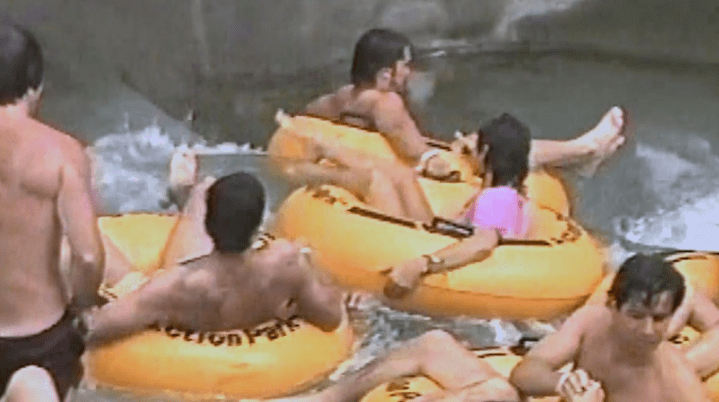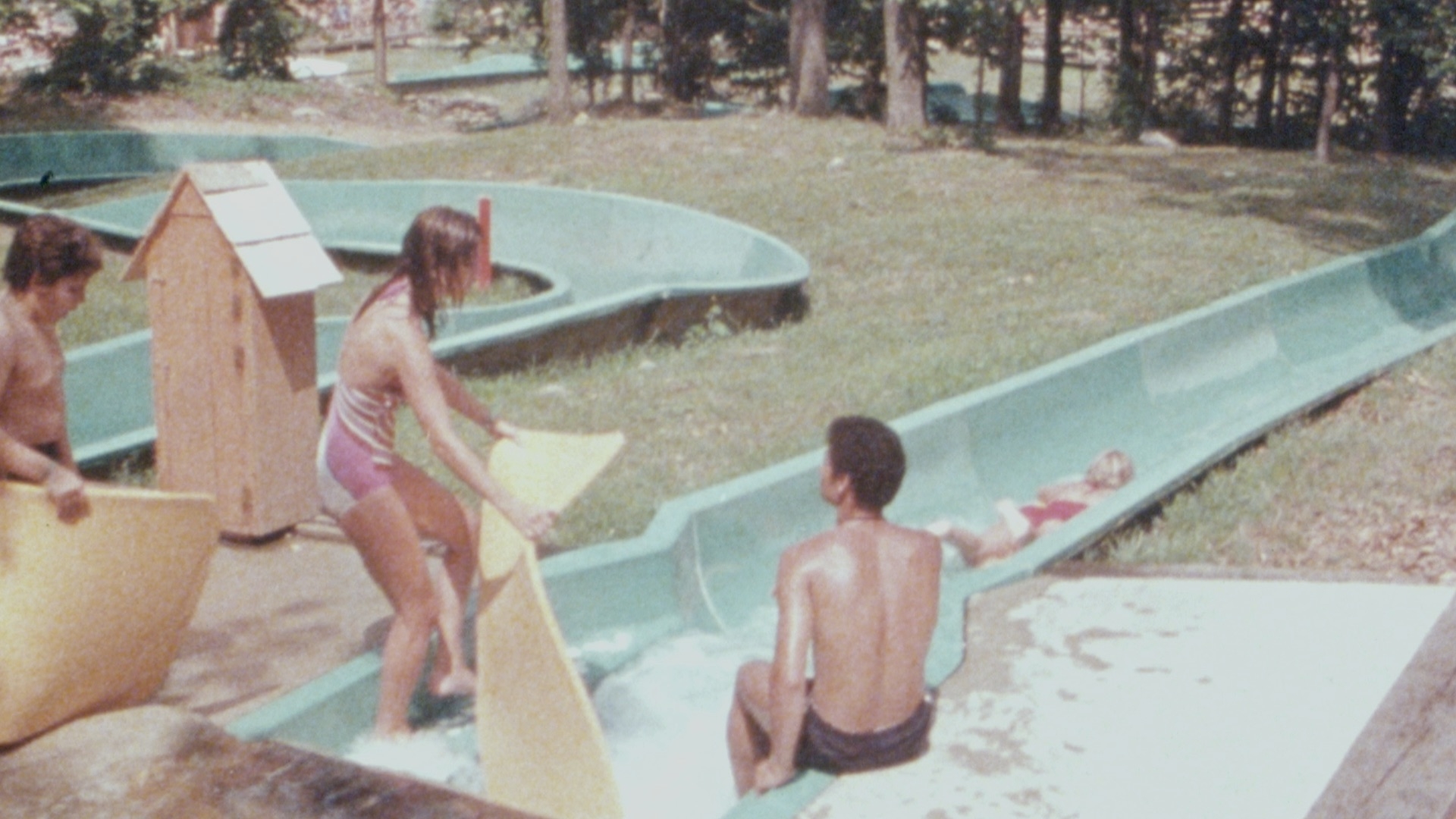
How a dangerous water park became the subject of a law course
How a dangerous water park became the subject of a law course

Our Econ Extra Credit series focuses on one documentary film a month with Marketplace themes. (Sign up for our newsletter here!) This month, we’re diving into “Class Action Park,” about an infamous and now defunct amusement and water park.
Action Park was a big hit in New Jersey back in the 1980s and ’90s. But while many visit theme parks for the thrill, the possibility of danger at Action Park was very real. The park saw countless injuries and several deaths. All told, there were more than 100 lawsuits connected to the park.
But the legacy of the park lives on in stories of wild rides, scars and even a law course.
Recreation and Risk: Lessons from Action Park, is taught by Bill Childs, a practicing lawyer and an adjunct professor at Mitchell Hamline School of Law.
“That sort of disjunction between what you think you’re getting when you go to an amusement park and what you actually got at Action Park, makes for a really neat intersection of things to talk about with law students,” he said.
Marketplace’s David Brancaccio spoke with Childs about why Action Park became the subject of a law class. The following is an edited transcript of their conversation.
David Brancaccio: Let’s start with a quick definition. My kind of torte has an “e” and is a layer cake with jam or whipped cream. What is your kind of tort, no “e”?
Bill Childs: So no E. It’s basically a civil action where somebody believes they’ve been injured by somebody else acting negligently. Failing to act with reasonable care under the circumstances.
Brancaccio: It’s a way, you know, in some cases that regular people can stand the chance of some kind of redress from a bigger organization that they think wronged them.
Childs: Yeah, or from just somebody else, right? It doesn’t have to be from a bigger organization. Everything from car crashes up through toxic tort, and many, many other things. Defamation is a tort. There’s lots and lots of things. But basically, if you think you’ve been injured and you think you should be, get some sort of remedy in civil law — nobody going to jail, nobody going to prison — then it’s probably going to be in the category of a tort.
“Where you’re the center of the action!”
Brancaccio: All right. Now, this documentary film. Planners of future water parks might be interested in learning what not to do from this defunct amusement and water park with the terrifying safety record. Maybe you don’t want to build your own right from scratch, improvising as you go along, if the film’s depiction of this is accurate. But what can law school students learn from watching this film with you?
Childs: Yeah, so it’s really a deep dive into an industry and sort of all of the legal … or most of the legal issues that touch on this industry, and it happens to be this very fascinating park in a generally pretty interesting industry. There’s lots of really good regulatory questions, you know, fixed-site parks don’t have any federal oversight on the rides themselves, where traveling carnivals do, and the state regulation varies dramatically. The other thing that I think is most interesting about Action Park is how different it is from basically anything that exists today, where the rider, the patron was at … this was actually their motto: “The center of the action.” They had so much control over their own experience, which was, on the one hand, presumably superfun. But on the other hand, made it so there are lots of ways that they can encounter risk, in a setting where people go with the hope of feeling like they’re in danger without actually being in danger. And so I think that bubble feeling, that sort of disjunction between what you think you’re getting when you go to an amusement park and what you actually got at Action Park, makes for a really neat intersection of things to talk about with law students.
Brancaccio: Right. At a modern theme park or water park, you don’t get to decide if you wear the special seat belt, you don’t get to decide if you do the ride upside down. It’s decided for you based on, presumably, safety reasons. And that can limit the range of risk if someone goes, but maybe a little less fun.
Childs: Yeah, I mean that’s an interesting question in terms of whether it makes it a little bit less fun. I will say that one of the things that I do in the class is have a panel of people who went to the park, and the thing I asked at the end every time is, “If it was open now, would you go?” And they all, almost embarrassingly, say, “Heck yeah.” That it was some of the most fun that most of these folks ever had, even if they came out with scars and scrapes.
Scrapes or Action Park tattoos?
Brancaccio: Yeah, I mean, a little road pizza, as they call it from scrapes is one thing, but some of the injuries, as you know, were worse at this thing. I know you’ve thought about the following, Bill, but I wanted to hear your view. Beyond state regulators, beyond lawsuits, one might have thought that bad press, the ugly publicity of people getting hurt at this New Jersey water park or dying in the water park, might have helped apply market pressure for either making the park safer or shutting it down. But it didn’t happen in this case.
Childs: Yeah, it’s one of the things that’s very different from, again, from modern water parks. The market pressures were a little bit askew, or seemed to be a little bit askew, as to Action Park in that the knowledge that there were real risks seem to be an attraction. And I think people didn’t think they were actually going to happen to them. But knowing that there was actual, literal danger in the offing there, I think was considered a positive. That’s one of the things in Gene Mulvihill, the owner’s, his son’s book, he talks about the scrapes that people got on the Alpine Slide as being “Action Park tattoos.” And they were seen as promotions in the communities.
Brancaccio: Seen as promotional. It’s such a bizarre reversal of the normal way of thinking about this. Now, many of us may not want to live in a world where we can’t be allowed, I don’t know, what do you call them, reasonable risks. I sign a waiver in case I were to crash on an organized bike ride. I mean, how do courts think about redress when things go wrong, but if you knowingly took a risk?
Childs: Yeah. So there’s a couple of different ideas there, right? There’s the idea of inherent risks, which is not exactly borrowed from but most prominently seen in the area of skiing. If you end up getting injured from an inherent risk of skiing or lots of other things like that, then generally speaking, as long as they didn’t do something to make that risk worse, the ski resort doesn’t have a duty to you to prevent you from running into other skiers or into trees or whatever. And then there also can be contractual ways to limit the liability, as you referenced with waivers. And sometimes there are some amusement parks that have some express waivers like that. It’s more common in things like high ropes courses or the more extreme haunted houses and things like that. And then just there’s the general doctrine of you knew what the risk was when you got onto this ride, and you assume that risk. And of course there’s also things where if you increase the risk to yourself by taking off your seat belt, you can have your recovery reduced or barred entirely.
Brancaccio: That might have come into play at Action Park when people might have thought of suing after some kind of injury. One of the things that the park seemed very interested in knowing is were you horsing around prior to your injury, right?
Childs: Yeah. One of the things that they were quite good at was getting statements from people who are involved in these accidents or injuries. And very often, they’re kids and they were quite honest. They would say, “I was horsing around,” “I was messing with my buddy,” “I didn’t really know how to swim very well.” And those statements would make it difficult for them to pursue litigation.
Class action? Not really.
Brancaccio: So, you know, don’t horse around, or if you get hurt, don’t say that to the representative of the park five minutes after your injury. Now, the film is called “Class Action Park.” It was one of the ironically dark nicknames for the place. Traction Park was another one because you might need to be put in traction in the hospital after a visit. But you’re a man of the law. “Class Action Park” seems like a misnomer, really.
Childs: It is. Class actions are generally when a large group of people have been harmed in some way that they can really recover the same thing all together. So if the park had been sneaking an extra 10 cent charge on every credit card transaction without telling you about it, OK well, that might be a class action. Class action’s almost never applicable in the context of physical injury. But it’s a cute name.
Brancaccio: It’s a cute name, right. It’s also hard to have created a class because the injuries would have been, you know, different in many cases.
Childs: Yeah, so disparate, and everybody’s got different, you know, preexisting conditions, situations, levels of their own fault in the situation. It’s just too much variability for a “class” to be the right way to go about it.
There’s a lot happening in the world. Through it all, Marketplace is here for you.
You rely on Marketplace to break down the world’s events and tell you how it affects you in a fact-based, approachable way. We rely on your financial support to keep making that possible.
Your donation today powers the independent journalism that you rely on. For just $5/month, you can help sustain Marketplace so we can keep reporting on the things that matter to you.


















